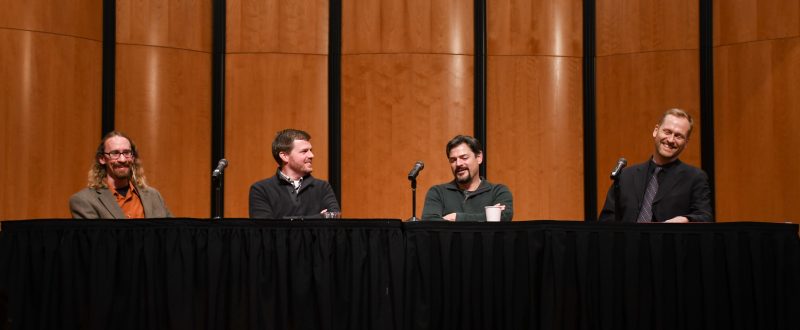Unique and creative minds met on Trinity’s campus, discussing their passions and inspirations both in their music as well as their lives. As part of Trinity’s Celebration of Living Composers Series, the Trinity Music Department held a panel with its three guest composers Carter Pann, Forrest Pierce, and Dan Forrest on both Saturday, January 13, and Sunday, January 14.
The panel was led by Brian Bondari, associate professor of music, who asked the composers a series of questions that opened up dialogue between them about life as a modern composer. The conversation began with the lessons that have stuck with the composers in their pursuit of music.
Forrest described three one-liners he had received from three different influential teachers in his life. The simplicity of these phrases such as “Give everybody a beautiful line” was striking. Forrest said these sayings made him think about the larger picture and not focus solely on his piano; rather, the things he felt most connected to were ideas that forced creative yet intuitive thought.
Pann had a similar one-liner phrase from his own teachers, but his advice for aspiring composers was to be more centered around enjoyment of the moment. The phrase that most stuck with him was “If you don’t love this, then you need to rethink what you’re doing.”
Both Forrest and Pann were influenced most by teachers they really loved; Pierce, on the other hand, claimed that he learned the most from teachers he hated. Pierce described certain practical and specific rules he learned from teachers he either found abusive or disliked. But Pierce’s last comment I found to be the most powerful and insightful into his own experience.
“It is possible to be kind, and support your students, and 100 percent be in their corner,” Pierce said when describing what the teacher he most loved taught him. His comments showed the intensity of the professional music world, and how support can truly make a difference on those you influence.
The composers went on to discuss drastic changes in their styles, which actually prompted them to describe their very distinct approaches to composition. Pierce described how emotionally attached he is to his music, but there came a time in his life where he was unable to compose anything. It took a moment when his students needed him to speak for him to find his inspiration again — however, everything he wrote after that day is completely different in style from his previous work.
“That was definitely a watershed moment for me. I couldn’t describe why it happened or what happened, but I know there was a big demarcation in my output.” Pierce said about his break in composing.
Pann said he has never had a major change in style. He did, however, state that the current political climate was poisoning his ability to write. Pann admitted to feeling so disgusted and upset by politics as of late that it distracts and prevents him from getting into his creative flow.
Forrest, upon describing how he similarly has not had a change in style, told of how he is generally emotionally detached from his work. Forrest stated that for the most part he has never composed anything that he felt reflected his emotional state. Composing to him is a job; a task that must be completed. The only major incident that prompted Forrest to use composition as an outlet was the loss of his brother’s adopted child. He wrote a piece that was therapeutic for himself, his brother and sister-in-law. Forrest seems to approach music in a very calculated manor, much more so than the other two composers.
One of the last, and seemingly most simple, questions summarized what I got out of the panel in its entirety. Bondari asked the composers if they needed to be in front of a piano to compose, to which all three answered literally, but then went on to describe the atmosphere they preferred to be in and the mindset they needed to get into. This brought up a discourse of how particular to an individual music is.
“We all approach this differently. I don’t want to sound like you, and vice versa.” Forrest said. Music is a self reflection, and is unique to each individual. This idea, I felt, was the most explored and visible in the composers’ lives. Each of them put themselves into their work and exemplify the openness of music.
I certainly found it interesting to hear how music is lived out in these professionals’ lives, and hope Trinity continues to bring this kind of dialogue to campus.







